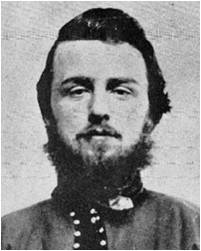I don’t know what
I’ll do if my brother ever decides to join the military. The number of young
men (and women now) joining to fight terrorism and evil dictators overseas is
astronomical. I know quite a few people fighting right now so that I can have
the freedom to write this.
During the Civil War,
the amount of young men leaving home to fight was even higher. They would watch
their fathers, brothers and friends leave to fight, and for the sake of
patriotism and pride, they would usually follow suit. They would go to fight
the evil of slavery or the overbearing Northerners. Well, not all of them felt
that way.
One of the main
feelings among the soldiers of this day was the overall feeling of brotherhood.
They’d fight and die right alongside the men in their company, but they also
felt a feeling of brotherhood with the enemy.
Why?
Because many on the
other side were their brothers.
The average Civil War
soldier was 25.8 years old, and families typically had 4 children. Thus, doing
a little propability (which I’m not really good at…) there were maybe 2 boys
per family. Thus there was a pretty good chance of a family with sons in
opposite armies.
(There you go, math people. More math on the history blog!)
The Civil War was
fought on beliefs and patriotism. It wasn’t completely a government drafting
men to fight (though that later happened on both sides), it was men joining voluntarily to fight based on what they
believed. Many moved South to fight with the Confederacy, and some moved North
to fight with the Union.
Or take Wesley Culp. There’s a story about this man from Gettysburg. He left his family farm to live in Virginia and later joined the Confederate Army. He had family and a very good friend who joined the Union Army, but he chose to side with the Confederacy. He came back to his family home during the Battle of Gettysburg, and was thought to have been killed fighting on Culp’s Hill: part of his family’s land.
The last example of
brothers fighting against each other lived not too far from where I’m typing
right now. In Union Mills, Maryland, there was an entire family divided, literally,
by a road, but also through differing beliefs. Andrew Shriver was on one side,
and his brother William on the other. Both had large families, and both had
sons who entered the war on opposite
sides. (Ironically enough, the man with a few slaves stood for the Union, and
the man without slaves stood with the South. You can tell these men lived in
Maryland, a border state….)
 |
| Image Source |
Though fiction, I
watched a good documentary a few months ago all about this topic of family on
opposite sides of the War. It was a mini-series called “The Blue and the Gray”,
and it followed a family’s experience across the Civil War. In the story, Ben
Geyser had 4 sons; three of whom join the Confederacy, while Jacob Hale, his
brother-in-law, had 3 boys, who all joined the Union Army. The fourth Geyser
son, John, stands alone in his neutrality, claiming that he can’t stand with
the Confederacy, but that he can’t stand against his brothers. This series is a
great representation of brother against brother and cousin against cousin.
What I find really interesting is that division caused resentment in some families' relationships, and didn’t change
relationships in others. While the Shriver families were always at odds, the
Campbell brothers communicated with each other through the entire war.
Imagine you had two
brothers. Always the best of friends, but with differing views on government;
they joined separate armies and went to war. Could you imagine the two boys; brothers, friends, separated and shooting at each other? That was a reality during the Civil War.
Brother against
brother, father against son. The pride of Americans was no less stiff than it
is today, and men had to fight for what they believed in, no matter if their
family followed or not.
Author's Note: Sorry I’ve been sporadic with posting these past weeks. I’m now wrapping up school, so I hope soon to
be more consistent with my posts. Plus, this blog is supposed to be approaching history with a fun, creative view, and I am
lacking inspiration for articles here lately. Maybe you could help: Have you
ever had a topic from the Civil War/soldiers in general that you were
interested in hearing more about? (Specific battles, myths, songs, etc.) Or had
a question about history’s relevance to today’s world? Let me know in the
comments!



No comments:
Post a Comment